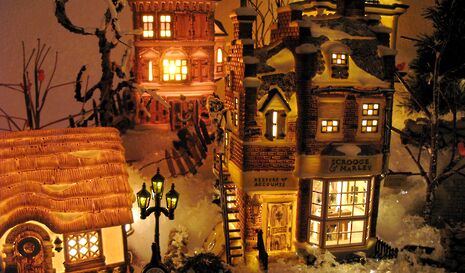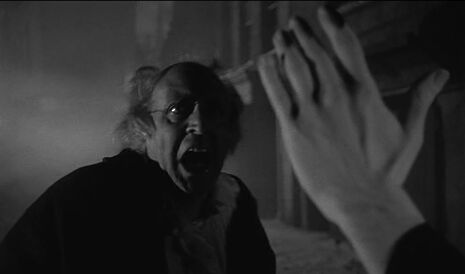The cynicism of Christmas in literature
Although we think of it as a time of togetherness and charity, Lydia Bunt shows us how representations of Christmas throughout literary history are often much darker

Christmas has had its fair share of literary representations over the years, and not always through the snowflake-spattered, sugar-dusted windowpane we might expect. In fact, it’s really the perfect starting line for tales of irony and hilariously tense human relationships. After all, it’d be a shame not to extract a bit of the macabre from such a happy time of year.
"In books and in real life, Christmas means putting a web of relationships under the microscope"
Are people nicer at Christmastime? Images of the March sisters waking up bleary-eyed on Christmas morning, feeling a sleepy twinge of disappointment when they remember the lack of stockings hanging on the mantelpiece, before reaching beneath their pillows to find lovingly hidden pastel-coloured Bibles, float to mind. Louisa May Alcott, whose characters in Little Women give up their carefully-prepared Christmas Day breakfast to a family poorer than them, probably isn’t much of a cynic. However, many other authors take this time of year and pull it apart, as one would a Christmas cracker.
Charles Dickens conjures up a lavish Christmas of fire-roasted chestnuts on flickering flames, candied fruits crusted with sugar, turkeys so large they could never have supported their own weight when alive, and the wafts of cinnamon and seasonal laughter from impoverished doors. We relish in the delights of the Christmases that come spewing from his pen and are only too happy to see Scrooge, classic miser of the ‘Bah! Humbug!’, reformed by them.
But, the Christmas of Dickens is bigger, better, purer and more selfless than any we’ve ever seen. It is made into a story, and therein lies its irony. Real-life personalities are neither as typecast, nor as reformable, as those in Dickens. So, we don’t really have a reason to believe in the magic of Christmas except as a fiction spun by the nib of a clever author: one who knows that his Christmas metamorphosis could hardly be a permanent change in a reality full of fairly normal, fairly selfish little people.
A literary Christmas, though, isn’t just about the individual. Family relations are often woven tighter, or else stretched to the seams, at Christmas. Who hasn’t wanted to hide behind the tinsel-swamped tree after Granny has upturned the Scrabble board in a rage? Or seen the wrath lighting up Mum’s face when someone makes a comment about the undercooked Christmas cake? In books and in real life, Christmas means putting a web of relationships under the microscope.

Kingsley Amis takes family strife at Christmas down a more-than-comical road. In Ending Up, Christmas brings to the surface the cantankerous grumbles and knife-sharp wordplay of five seemingly indefatigable OAPs. It is the setting for 73-year-old Bernard’s fastidiously planned jibes: stink bombs, scattered urine samples, chewed-up letters, cats squirted with water pistols are among them. The younger members of the family, induced to spend Christmas Day with their rotting seniors, undertake the task of amusing them without the slightest trace of peace or goodwill.
Pettiness erupts into sudden and darkly funny disaster, as we realise that old age and accident are not whitewashed by the magic of Christmas. Family interactions, we realise, are hardly different to the endless scrabbles between the resident cat and dog. Christmas is Amis’ personally crafted and hermetically sealed human catastrophe, and makes ageing human relations into a laughing stock for more than just the Christmas dinner gravy.
Narnia provides a similar setting for seasonal strife. C.S. Lewis’ fur-lined world through the wardrobe is a snowy contradiction: ‘always winter, never Christmas’. The wintry scene of snow-topped pines and colloquial animals foregrounds Edmund’s tricky decision between his siblings’ safety and some Turkish delight. Would Christmas be the solution to Narnia’s woes? Maybe - or maybe Lewis’ magical world is just a pared-back Christmas, without that functional layer of human solidarity that often hides the comically darker base nature of social relations.
Christmas as a classic romantic trope, where lovers find their perfect harmony in flocking snowflakes, is also ripped to shreds in certain works of literature. In Jane Austen's Emma, the title character's attempts to match-make Harriet Smith and Mr Elton are forestalled on Christmas Eve by a seasonal cold and a tempestuous blizzard. Emma herself is left at the mercy of Mr. Elton’s boundless affections, which turn out to actually be directed towards her. Her matchmaking falls apart in the Christmas snowstorms, and with this, Austen deconstructs a cohesive Christmas into a mass of confused and rather hilarious romantic attachments.
Of course, we can still appreciate all the magic that a literary Christmas has to offer, sleigh bells and snowflakes encompassing. Perhaps, though, it is that niggling feeling that such a magic is a little too good to be true, and the author’s knack of underpinning it with a dusting of black humour and a smattering of uneasy personal relationships, that really makes this time of year all the better
 News / Eight Cambridge researchers awarded €17m in ERC research grants27 December 2025
News / Eight Cambridge researchers awarded €17m in ERC research grants27 December 2025 News / Downing investigates ‘mysterious’ underground burial vault 29 December 2025
News / Downing investigates ‘mysterious’ underground burial vault 29 December 2025 Lifestyle / Ask Auntie Alice29 December 2025
Lifestyle / Ask Auntie Alice29 December 2025 Sport / Hard work, heartbreak and hope: international gymnast Maddie Marshall’s journey 29 December 2025
Sport / Hard work, heartbreak and hope: international gymnast Maddie Marshall’s journey 29 December 2025 Science / Astronomical events to look out for over the break29 December 2025
Science / Astronomical events to look out for over the break29 December 2025










